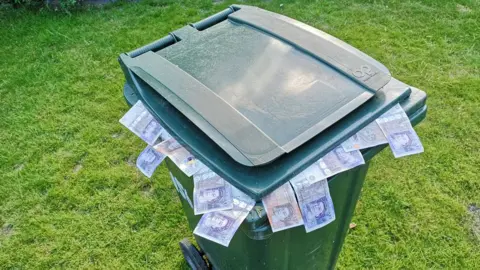Reading council set to raise 'lucrative' green bin collection fee
 Jason Collie
Jason CollieA council that raised more than £700,000 from a £50 garden bin collection charge is to raise the fee by 20%.
Reading Borough Council began charging for household collections last year in a bid to cope with the running costs.
Despite generating more than double the stated £300,000 overheads, it said the hike in the charge is needed to offset "rising costs".
But critics say the authority is using local residents as "cash cows".
The £50 charge was introduced in April 2017, repeated this year and is now set to rise to £60 in April 2019.
The Labour-run council confirmed in January that it needed to continue the household charge due to "unprecedented cuts in central government funding".
At that time, £703,311 had been generated from the collections, a Freedom of Information request showed.
'Rake in the cash'
However, the council said it had actually spent £550,000 running the service and the surplus revenue had been used to offset the costs of other domestic waste services in Reading.
Former Lib Dem leader Ricky Duveen told the BBC: "The words 'cash cow' spring to mind. They are doing it to rake in the cash.
"They are short of money like all councils but they have no reason to fleece residents who have gardens just because they can."
Mr Duveen said he suggested to the council they charge £25 "when they started down this route", insisting this would more than cover costs.
In 2011, the then new Labour minority council scrapped a proposed £22.50 annual charge for the service, reinstating free garden waste collection.
The current council said it is "benchmarking" fees with other local authorities and estimates on income are based on "the experience of neighbouring areas when charges were first introduced".
"The council has been clear from the outset that a fee was introduced as it could no longer afford to provide a free discretionary service in the face of severe government reductions in funding," it added.
Local resident Jason Collie told the BBC: "We know the council is cash-strapped, but that does not mean that 16,000 [households] don't deserve honesty."
